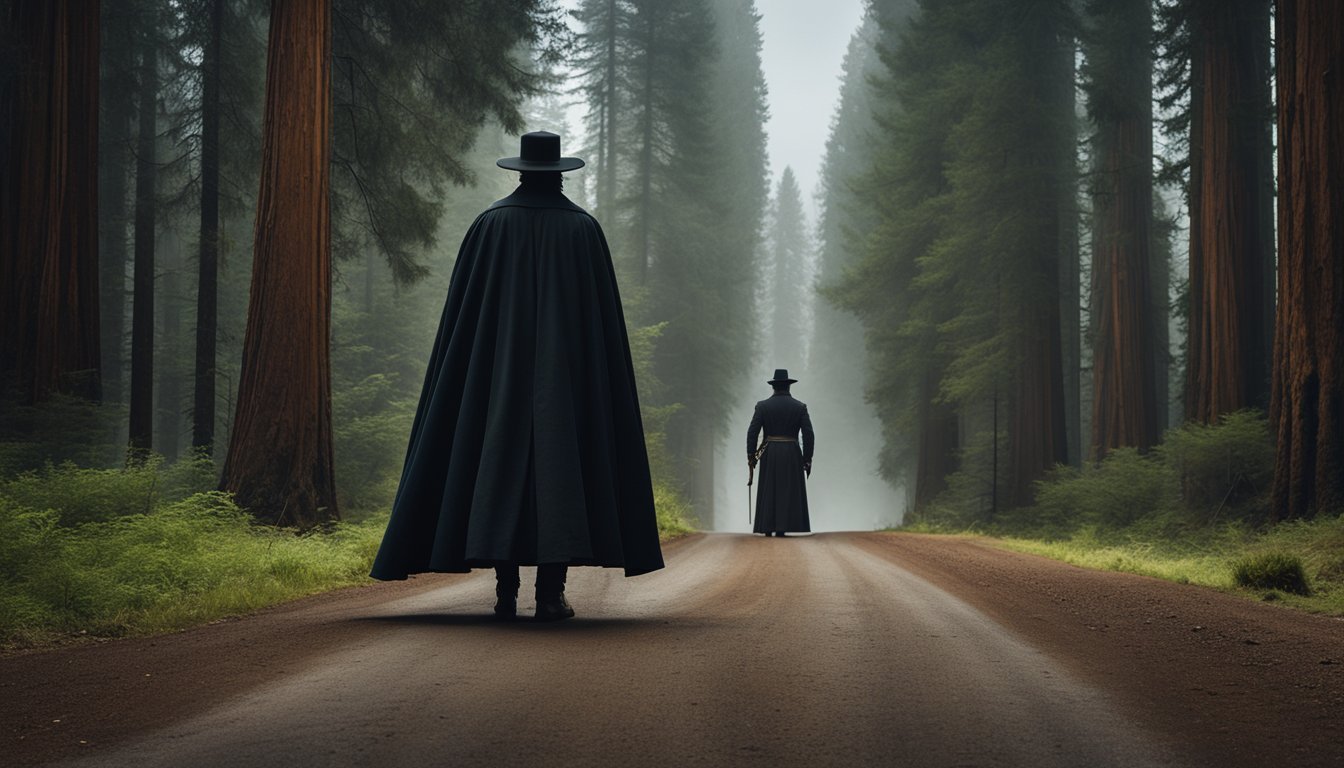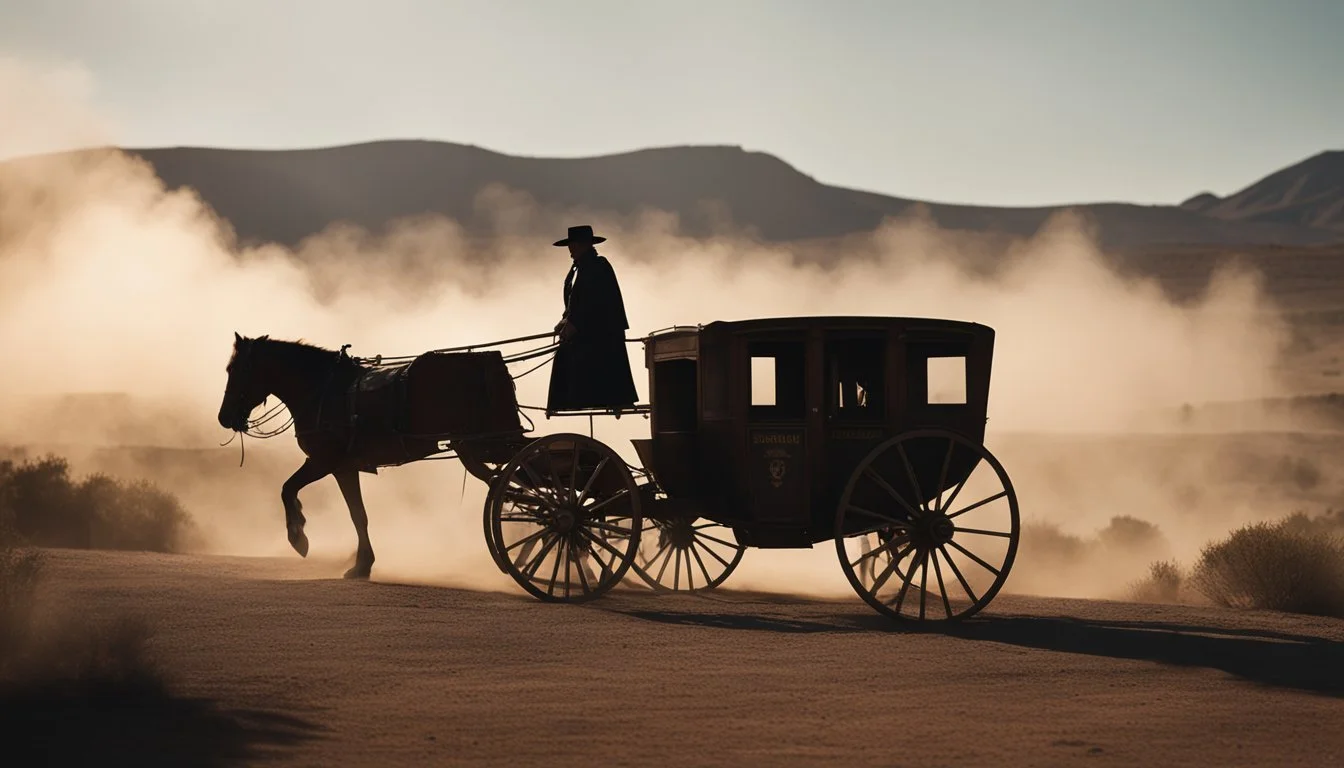4 Fascinating Black Bart Documentaries You Can't Miss
Exploring the Legend of the Gentleman Bandit
Black Bart, the infamous outlaw of the American Wild West, continues to captivate audiences with his unique blend of criminal prowess and poetic flair. Known for his polite demeanor during robberies and his habit of leaving behind witty verses, Charles E. Boles, alias Black Bart, stands out as one of the most intriguing figures of his era.
Documentaries offer a compelling way to explore the life and legend of Black Bart, providing viewers with in-depth analyses and historical context. These films delve into his background, motivations, and the impact he left on American folklore. From his early days as a gold miner to his career as a notorious stagecoach robber, Black Bart's story unfolds through expert interviews, reenactments, and archival footage.
1) "The Outlaw Chronicles: The Tale of Black Bart" by History Channel (2015)
This History Channel documentary offers a comprehensive look at the life and crimes of Charles Boles, better known as Black Bart. The film explores his transformation from a respectable businessman to a notorious stagecoach robber.
Viewers are treated to expert interviews and historical reenactments that bring Black Bart's story to life. The documentary delves into his unique modus operandi, including his penchant for leaving poetic messages at crime scenes.
The film examines Black Bart's impact on California's Gold Rush era and the efforts of Wells Fargo to capture him. It also discusses his eventual arrest and the mystery surrounding his disappearance after serving time in prison.
"The Outlaw Chronicles" provides a balanced portrayal of Black Bart, presenting him as both a criminal and a folk hero. The documentary's high production values and attention to historical detail make it a must-watch for anyone interested in Old West outlaws.
More information on "The Outlaw Chronicles: The Tale of Black Bart"
2) "Black Bart: The Gentleman Bandit" by PBS (2018)
This PBS documentary sheds light on the intriguing life of Charles Boles, better known as Black Bart. The film explores how Boles transformed from a Wells Fargo stagecoach robber into a legendary figure of the American West.
Viewers learn about Bart's unique approach to crime, which earned him the moniker "Gentleman Bandit." The documentary highlights his polite demeanor during robberies and his habit of leaving poetic messages at crime scenes.
PBS delves into Bart's background, including his time as a Civil War veteran and gold prospector. The film also examines the detective work that eventually led to his capture and conviction.
Through expert interviews and historical reenactments, the documentary paints a vivid picture of Bart's exploits and the era in which he operated. It offers insight into the public's fascination with this charismatic outlaw.
The film concludes by discussing Bart's mysterious disappearance after his release from prison, leaving viewers to ponder the final chapter of his story.
More information on Black Bart
3) "California's Infamous Highwayman: The Black Bart Series" by Unsolved Mysteries (1994)
The Unsolved Mysteries series delves into the life and crimes of Black Bart in their episode "California's Infamous Highwayman: The Black Bart Series." This documentary explores the legendary stagecoach robber's exploits in the late 1800s.
The episode reconstructs Black Bart's most infamous heists, showcasing his unique method of operation. It highlights his polite demeanor and poetic calling cards, which set him apart from other outlaws of his time.
Interviews with historians and law enforcement experts provide insight into Black Bart's impact on California's Wild West era. The documentary also examines the manhunt that eventually led to his capture and subsequent imprisonment.
Viewers gain a deeper understanding of Black Bart's motivations and the societal factors that contributed to his criminal career. The series presents a balanced view of the outlaw, exploring both his notoriety and the public's fascination with his persona.
More information on Unsolved Mysteries
4) "Unmasking Black Bart" by Biography Channel (2006)
"Unmasking Black Bart" offers a comprehensive look at the life and crimes of Charles Bowles, the infamous stagecoach robber. This Biography Channel documentary explores Bowles' transformation from a respectable citizen to the notorious Black Bart.
The film delves into Bowles' early years and the events that led him to a life of crime. It examines his unique modus operandi, including his penchant for leaving poetry at crime scenes and his refusal to harm passengers or steal from the U.S. mail.
Interviews with historians and law enforcement experts provide insights into Black Bart's impact on the Old West. The documentary also covers the extensive manhunt that eventually led to his capture and subsequent imprisonment.
"Unmasking Black Bart" paints a nuanced portrait of this complex figure, highlighting both his criminal activities and his surprising code of honor. The film explores the public's fascination with Black Bart and his enduring legacy in American folklore.
More information on "Unmasking Black Bart" documentary
Historical Context of Black Bart
Black Bart, also known as Charles Boles, was a notorious stagecoach robber who operated in California during the late 19th century. His unique methods and poetic calling cards made him a legendary figure in American Old West history.
Early Life and Times
Charles Boles was born in England in 1829 and immigrated to the United States as a child. He served in the Union Army during the Civil War, rising to the rank of sergeant. After the war, Boles tried his hand at mining in Montana and Idaho with limited success.
In 1871, Boles disappeared from his family, leaving behind a wife and three children. He resurfaced in California under the alias "Charles Bolton" and began his career as a stagecoach robber.
Boles adopted the moniker "Black Bart" for his criminal activities, though he never actually used this name during his robberies.
Notorious Stagecoach Robberies
Black Bart's first recorded stagecoach robbery took place on July 26, 1875, in Calaveras County, California. He went on to commit at least 28 robberies over the next eight years.
Known for his politeness and non-violent methods, Black Bart never fired a shot during his robberies. He often used an unloaded shotgun to intimidate his victims.
Black Bart's trademark was leaving behind poems at the scene of his crimes. These witty verses added to his mystique and popularity among the public.
His last robbery occurred on November 3, 1883. Authorities finally caught up with him after discovering a handkerchief with a laundry mark at the crime scene.
Impact on Popular Culture
Black Bart's daring exploits and charismatic persona have left an enduring mark on American folklore and popular culture. His legendary status has inspired numerous creative works across various mediums.
Literary References
Black Bart's story has captivated authors and poets for generations. Bret Harte, a prominent 19th-century writer, immortalized the outlaw in his poem "The Society Upon the Stanislaus." The poem humorously depicts Black Bart's encounter with a group of miners.
Several novels have featured Black Bart as a central character or influential figure. Mary McNeil Fenollosa's "The Dragon Painter" (1906) includes a subplot involving the infamous stagecoach robber. More recently, Loren D. Estleman's "The Branch and the Scaffold" (2009) weaves Black Bart into its historical narrative.
Film and Television Portrayals
Black Bart's larger-than-life persona has made him a compelling subject for visual media. The 1948 film "Black Bart" starring Dan Duryea loosely portrayed the outlaw's life, blending fact with Hollywood fiction. While not entirely accurate, it helped cement Black Bart's place in popular culture.
Television series have also featured Black Bart. The Western drama "Death Valley Days" included an episode titled "Black Bart" in 1967, offering a dramatized account of his exploits. More recently, documentary series exploring the Old West have dedicated segments to Black Bart, analyzing his impact on California's history and outlaw culture.




